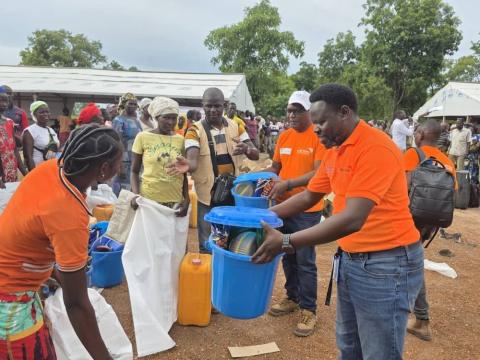Empowering Vulnerable Communities in Central African Republic: Insights from a Recent Field Visit

As the Integrated Programme Director for World Vision Central African Republic, Stephen Carlos Ongom-WV had the privilege of our Paoua base in the northwest region from July 24 to 29, 2025. During this time, he engaged in a series of activities aimed at supporting refugees and host families facing significant challenges.
In collaboration with our valued partner, Aktion Deutschland Hilft e.V. we distributed essential kits to refugees in Betoko. These kits are designed to enhance overall wellbeing, health, and resilience by providing items that facilitate daily living and promote hygiene practices.
Stephen was pleased to interact with a farmer who has benefited from our ADH-funded multi-sector hunger response project. Through this initiative, World Vision has procured and distributed high-quality seeds and tools, with the objective of expanding cultivated acreage to bolster food security and strengthen agricultural livelihoods. It was particularly encouraging to observe how the farmers have effectively utilized not only the provided resources but also the comprehensive training on soil and water conservation, biological pest control, crop rotation, and post-harvest management.
Accompanied by his colleagues, Stephen officially launched the Integrated Multi-Sector Hunger Response Project. This project seeks to improve food security, nutrition, protection, and water, sanitation, and hygiene (WASH) conditions for refugees and host families in Paoua and Betoko. It achieves this through integrated life-saving humanitarian assistance and resilience-building interventions. He underscored the importance of maintaining full accountability and transparency, while safeguarding child rights and ensuring that children’s voices are amplified throughout the project’s implementation.
Stephen also had the opportunity to address the refugee community in Betoko regarding the multipurpose cash distributions under the project. Discussions covered the responsible utilization of the funds, available accountability and community feedback mechanisms, and the broader humanitarian funding landscape. The session was enriched by responding to community questions and addressing concerns related to safety, protection, and economic resilience.
Additionally, Stephen conducted a focused group discussion with women receiving multipurpose cash assistance through the ADH-funded project. These targeted households have been provided with cash transfers to enable the purchase of essential goods and services based on their specific needs. The insights from the conversation highlighted how this assistance empowers beneficiaries to prioritize critical expenses, including food, healthcare, education, and other necessities.
At World Vision, we remain steadfast in our commitment to transforming lives and fostering sustainable change.